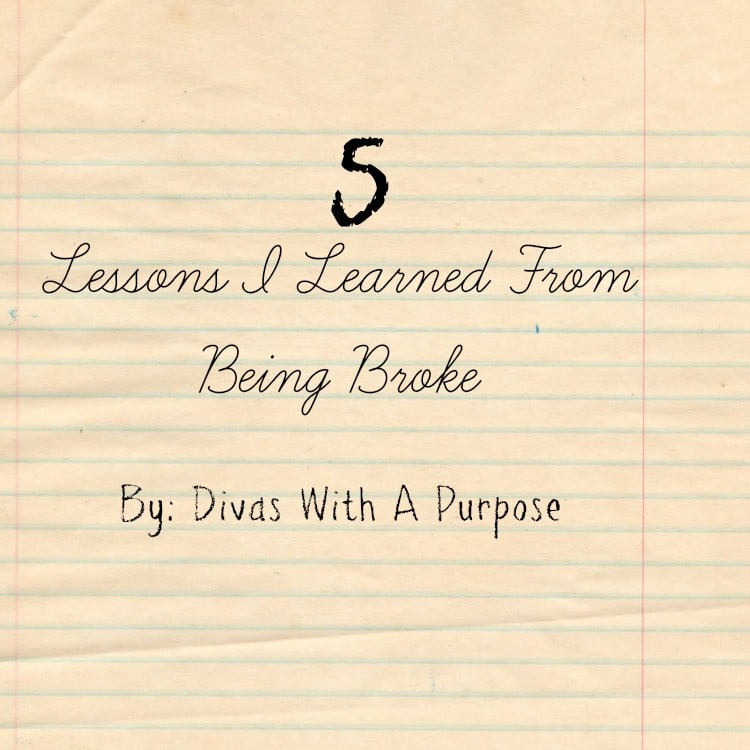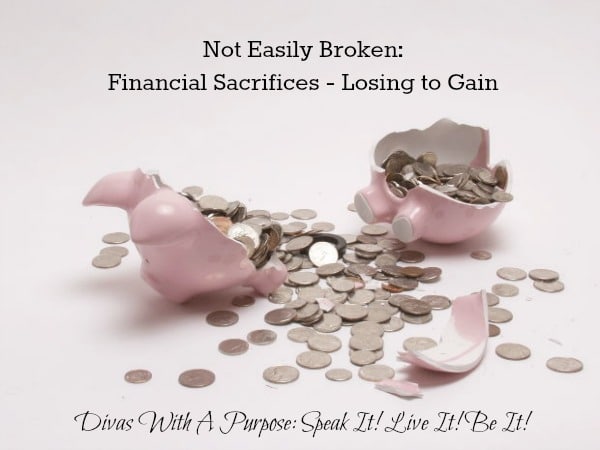5 Lessons I Learned From Being Broke
Years ago, I made a conscious decision to stop using the word “broke” to describe my financial status.
Why?
Well, I realized that I was applying the term not only to my finances, but it was impacting my overall attitude towards everything. I became obsessed (and depressed) by the fact that our funds were at what seemed like way past the point of being resuscitated. I had given up and given in to being “broke”, helpless and hopeless.
It wasn’t a fun time at all.
Financial problems impacted my marriage, my friendships, my everything.
During that time period, I had some serious self-talks and “ah-ha” moments.
I vowed to eliminate the word “broke” from my vocabulary but the lessons I learned from being broke have made a tremendous impact on me years later.
Related Article: #BugetingDivas: Creating An Effective Budget
Lesson #1:
If it’s below the line – it’s below the line. This concept came from Dave Ramsey’s Financial Peace University. I was able to take the course through my job and it was a game changer for me. It was one of those “ah-ha” moments where I realized I needed to make some serious changes for myself and my family. I was so focused on “catching up” and stressing over who I owed, how much I owed and how to pay everyone to keep from getting those dreaded collection calls.
The “below the line” concept is fairly simple. My version is to list out the dollar amounts of the following: your necessities, emergency fund allocation, and what payments you owe towards bills. Now take what you have coming in and subtract each of those items from that total. Once you get to $0 – guess what? That’s it. You have no more to allocate. Why stress? If you’re necessities are being met – childcare, shelter, food – and you’re not making frivolous purchases. At this point there’s nothing else you can do and there’s no reason to stress.
From here based on your totals, you now have decisions to make – like finding ways to increase your income or eliminating or reducing necessities that aren’t really necessities.
Lesson #2:
Money – having it or the lack of it – does not impact my joy. I remember getting seriously depressed because I didn’t have certain things or couldn’t provide “extras” for my family. I was so focused on the material things and what we didn’t have that I would often miss out on so many great moments that were right in front of me and didn’t cost a dime.
Ponder on this question – what’s the best memory you have with your family? Does it involve stuff? Expensive purchases? Typically the best memories are the simplest moments. Realizing and embracing that shifted my priorities and helped me reclaim family time. It, also, impacted my demeanor. Just because I am lacking monetarily does not mean I have to get depressed about it. Again – it won’t change my bank account balance. Striving to stay positive and focusing on what I have rather than what I don’t makes a big difference.
Lesson #3:
There’s a lot of things I could easily do without. Many of things I wanted – I really didn’t need. Quite a bit of what I was spending extra on – were things that really and truly were not a necessity. When paying down debt or just regaining balance in your finances often calls for you to cut down to the bare minimums. Once I made the conscious decision to do better by my family making financial sacrifices was not as hard as I thought it would be. I made a game out of being as frugal as possible and still having fun – girls nights in, picnics in the backyard, trips to the park, free museum days, movie and game nights at different friends homes, and so much more.
Temporarily giving up on splurges and extras was okay when focusing on the long-term benefits. Eliminating eating out for lunch for a year so I could pay off 3 major bills was completely worth it. And now, the desire to eat out regularly for lunch is no longer there and I enjoy the quiet time I spend at home on my lunch break.
Lesson #4:
It’s okay to admit you don’t have it. There’s no shame in letting others know something is not in your budget. You don’t have to give details, but do not spend money you don’t have because you are too embarrassed to say “it’s below the line”. My friends and co-workers have gotten to the point where they’ll ask “Is xyz in your budget this week?” And there is no pressure if I say no. They understand that I have specific financial goals I am striving to meet and they are willing and able to offer moral support. If this is a struggle for you, get a trusted accountability partner.
Lesson #5:
Learn to accept help and be willing to pay it forward when you can. This lesson is directly related to Lesson #4. I had to learn to accept help from others because it was coming from a place of sincerity and often was offered when I absolutely needed it the most. From friends providing hand-me-downs, diva-friends randomly dropping off dinner, and even the person who anonymously paid my mortgage one month (yes!!!). If someone is willing to help, graciously say thank you and keep it moving. The best way to repay them? Pay it forward in whatever way you can and remember those moments when you are in a better financial situation and reciprocate to others when possible.


